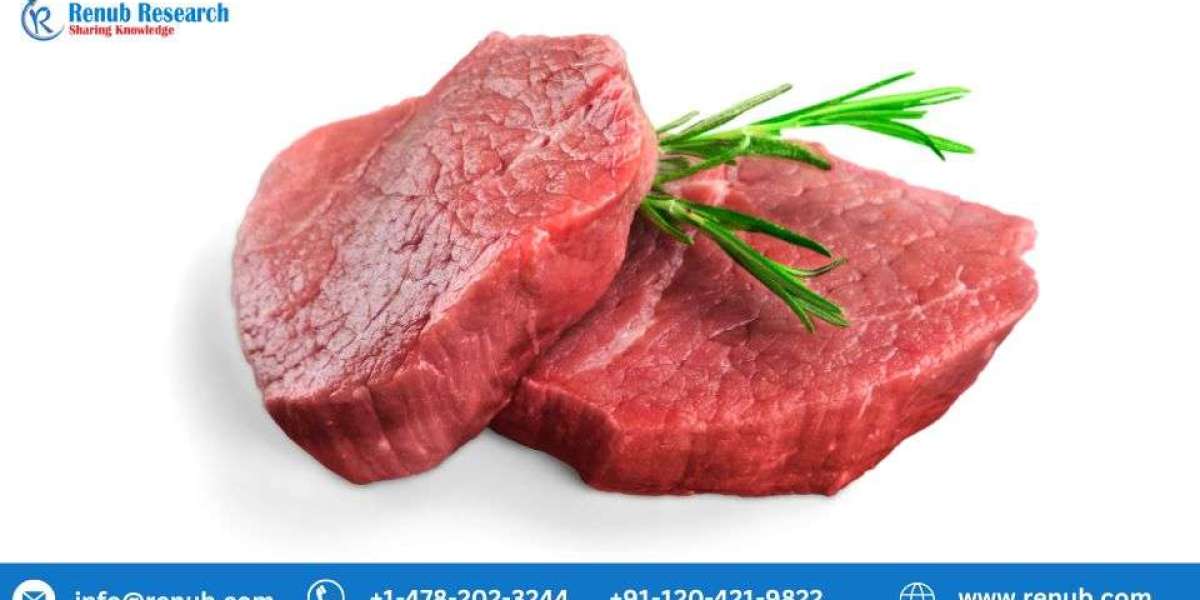Global Beef Market Analysis
As per the Renub Research's latest report by titled “Global Beef Market Forecast Report By Consuming Countries (United States, China, Brazil, European Union, India, Argentina, Mexico, Russia, Japan, United Kingdom, Canada, Others), Producing Countries (United States, Brazil, China, European Union, India, Argentina, Australia, Mexico, Russia, Canada, South Africa, Others), Importing countries Global Beef Market, Exporting Countries and Company Analysis 2024-2032" The Global Beef Market will reach US$ 720.58 billion by 2032, up from US$ 500.18 billion in 2023, with a CAGR of 4.14% between 2024 and 2032. In the past, many cultures believed beef was a luxury that could only be enjoyed on specific days or special occasions of the week. Nowadays, it is a staple found in nearly all restaurants and many kitchens worldwide. Beef has higher protein content than pork, turkey, chicken, and lamb. Surging awareness associated with protein consumption through high nutritional food is gaining importance.
Regardless, the rise in population and consumer disposable income and beef emerging as a critical source of protein are significant factors driving the beef market. Beef is one of the most consumed meat forms globally and is only second to pork in volume consumption. There is a significant supply-demand gap in the market due to the limited production of this meat owing to various environmental and political aspects. Further, the rapid and recent spread of infections in the poultry and pork markets has resulted in consumers turning to beef and associated products. Besides, increasing demand for unique cuts of meat, including halal beef and kosher, is expected to fuel the beef market.
COVID-19 Impact:
The onset of the COVID-19 pandemic has strongly impacted the global beef industry, especially in the first half of 2020. The COVID-19-related temporary shutdown of the meat processing industry will strongly affect the supply-demand curve for beef in 2020. The closure of restaurants in many world regions had a negative effect on the beef industry.
Nonetheless, the demand from ecommerce and online retail stores amid the ongoing COVID-19 pandemic has to raise the sales of beef and beef products in 2020. Moreover, due to the fluctuating economy and the growing uncertainty related to inflation, the global beef market will witness sluggish growth in the forecast period.
The United States is one of the largest producers of beef in the global market:
In the few years, the United States has witnessed significant imports of chilled grass beef. Demand from restaurant chains such as McDonald’s and Burger King is also expected to contribute to the growth of the United States market. The Islamic population's growth will trigger demand for halal beef over the coming year. In addition, the safety and quality benefits of kosher beef will begin demand in the North American region. Enhancement in slaughtering techniques and improvement in animal feed technology is projected to create opportunities for various market participants in the value chain.
Likewise, beef consumption across developing regions, including United States, China, Brazil, European Union, India, Argentina, Mexico, Canada, Russia, and Japan has witnessed consistent growth over the past few decades. The global beef supply chain substantially influences the overall pricing of beef and beef-related products. Beef consumption has increased consistently over the past few decades despite concerns raised by scientists and researchers about the consumption of red meat. The entry of various cold storage alternatives, the exponential rise in the number of local butchers, and the growing need for protein-rich food products are significant aspects foreseen to fuel the development of the beef industry during the forecast period.
Related Report :
Brazil is the largest beef exporter in the world:
Globally, Brazil is the biggest exporter of beef, followed by India, Australia, the United States, Argentina, New Zealand, Canada, Uruguay, Mexico and Paraguay. Despite already being the biggest exporter of meat, Brazil was also one of the country’s growing exports the strongest, together with Canada and Argentina. While Brazilian beef is undoubtedly a sought-after product abroad, Brazil has also been criticized for its cattle industry, which is strongest in the country's central states and has generated a lot of deforestation. Cattle need feed and room to feed. Millions of acres have been removed to make room for the animals themselves and soy farms, a crop of which 80% is utilized for animal meal worldwide.
In importing countries, the United States, China, Japan, South Korea, Russia, Chile, European Union, Hong Kong, Egypt, and Malaysia are importing countries. Amongst the importing countries United States, China, and Japan are the top beef importers globally.
Key Players:
The global beef industry is highly competitive and fragmented with players like JBS S.A, Tyson Foods, Pilgrim's Pride Corporation, Danish Crown Group, Vion Food Group, WH Group, Hormel Foods Corporation, and Muyuan Foods.
Market Summary:
- Producing countries – Our Report covered by producing countries from 11 viewpoints (United States, Brazil, European Union, China, Argentina, India, Australia, Mexico, Russia, Canada and Others)
- Consuming Countries – Renub Research Report covered global beef market by consuming countries from 10 viewpoints (United States, China, Brazil, European Union, India, Argentina, Mexico, Canada, Russia and Japan)
- Importing Countries –This Report have been covered by importing countries from 10 viewpoints (United States, China, Japan, South Korea, Russia, Chile, European Union, Hong Kong, Egypt, and Malaysia)
- Exporting Countries - We have covered global beef market breakup by 10 viewpoints by Exporting Countries (Brazil, India, Australia, United States, Argentina, New Zealand, Canada, Uruguay, Mexico and Paraguay)
- All the major players have been covered from 3 Viewpoints (Overview, Recent Development, and Revenue Analysis) JBS S.A, Tyson Foods, Pilgrim's Pride Corporation, Danish Crown Group, Vion Food Group, WH Group, Hormel Foods Corporation, and Muyuan Foods.
About the Company:
Renub Research is a Market Research and Information Analysis company with more than 15 years of experience in Research, Survey, and Consulting. Our research helps companies to take business decisions: on strategy, organization, operations, technology, mergers & acquisitions, etc. Till now we have published more than 9000 syndicated reports and worked on more than 750 custom research projects. Currently, we are supplying data to EMIS, Bloomberg, Thomson Reuters, etc. We support many blue-chip companies by providing them with findings and perspectives across a wide range of markets.
Media Contact:
Company Name: Renub Research
Contact Person: Rajat Gupta, Marketing Manager
Phone No: +1-478-202-3244 | +91-120-421-9822 (IND)
Address: 225 Kristie Ln, Roswell, GA 30076
Email: [email protected]
LinkedIn: https://linkedin.com/company/renub-research
Website: www.renub.c



